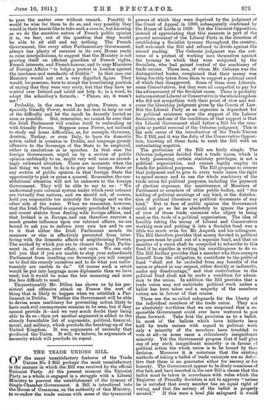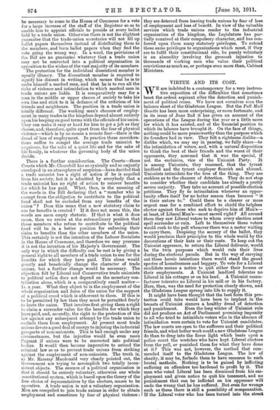THE TRADE UNIONS BILL.
OF the many unsatisfactory features of the Trade Unions No. 2 Bill perhaps the most unsatisfactory is the manner in which the Bill was received by the official Unionist Party. At the present moment the Unionist Party as a whole is engaged in a struggle with a Liberal Ministry to prevent the establishment of the tyranny of Single-Chamber Government. A Bill is introduced into the House of Commons, on the authority of. this Ministry, .te re-endow the trade unions with some of the tyrannical powers of which they were deprived by the judgment of the Court of Appeal in 1908, subsequently confirmed by the House of Lords in 1909. Yet the Unionist Opposition, instead of appreciating that this measure is part of the general movement of the Liberal Party in the direction of establishing a Socialist tyranny throughout the country, half welcomed the Bill and refused to divide against the second reading. The Osborne judgment was the out- come of a protest of working men themselves against the tyranny to which they were subjected by the Socialists, who had gained control of the machinery of trade unions. These men, of whom Mr. Osborne was the distinguished leader, complained that their money was being forcibly taken from them to support a political creed of which they disapproved. Some of them were Liberals, some Conservatives, but they were all compelled to pay for the advancement of the Socialist cause. There is probably not a consistent Liberal or Conservative in the whole kingdom who did not sympathize with their point of view and wel- come the liberating judgment given by the Courts of Law. But the Liberal Party as an organism is dependent for its political existence upon the support of the Labour Socialists, and one of the conditions of that support is that the Liberal Government shall father a Bill for the com- plete or partial reversal of the Osborne judgment. This is the sole cause of the introduction of the Trade Unions No. 2 Bill, and it was the duty of the Conservative Opposi- tion, knowing all these facts, to meet the Bill with an unhesitating negative. The provisions of the Bill are fairly simple. The Osborne judgment decided that a trade union, which is a body possessing certain statutory privileges, is not a political organization, and cannot legally employ its funds for political purposes. The Bill proposes to reverse that judgment and to give to every trade union the right to spend money and to use the whole machinery of the trade union for political purposes, including the payment of election expenses, the maintenance of Members of Parliament or members of other public bodies, and "the holding of political meetings of any kind, or the distribu- tion of political literature or political documents of any kind." But in face of public opinion the Government could not go so far as absolutely to ignore the point of view of those trade unionists who object to being used as the tools of a political organization. The idea of forcibly taking the money of Liberal and. Conservative working men and putting it into a Socialist fund was a little too much even for Mr. Asquith and his colleagues. The Bill therefore provides that money devoted to political purposes must be paid. out of a separate fund, and that no member of a union shall be compelled to subscribe to this fund if he signifies in writing his unwillingness to do so. The Bill further provides that a member who thus exempts himself from the obligation to contribute to the political fund "shall not be excluded from any benefits of the union or placed in any respect, either directly or indirectly, under any disadvantage,' and that contribution to the political fund shall not be made a condition for admis- sion to the union. In addition the Bill provides that s trade union may not undertake political work unless a ballot has been taken and. a, majority of the members voting are in favour of that course.
These are the so-called safeguards for the liberty of the individual members of the trade union. They are so absolutely worthless that we are surprised that s re- sponsible Government could ever have ventured to put them forward. Take first the provision as to a ballot. In most of the ballots which have hitherto been held by trade unions with regard to political work only a minority of the members have troubled to vote at all—in some cases a ridiculously insignificant minority. Yet the Government propose that if half plus one of any such insignificant minority is in favour of political action the whole union is to be bound by that decision. Moreover it is notorious that the existing methods of taking a ballot of trade unionists are so defec- tive that there is no guarantee either for secrecy or for honesty. The Government appear to be dimly conscious of this fact, and have inserted in the new Bill a clause that the ballot must be taken in accordance with rules which the Registrar of Friendly Societies is not to approve "unless he is satisfied that every member has an equal right of voting, and that the secrecy of the ballot is properly secured." If this were a bond fide safeguard it would be necessary to come to the House of Commons for a vote for a large increase of the staff of the Registrar so as to enable him to appoint officials to preside at every ballot held by a trade union. Otherwise there is not the slightest guarantee that the trade-union secretaries will not fill up ballot papers themselves instead of distributing them to the members, and burn ballot papers when they find the vote going the wrong way. In a word, the provisions of the Bill are no guarantee whatever that a trade union may not be converted into a political organization in opposition to the wishes of the vast majority of its members. The protection for the individual dissentient member is equally illusory. The dissentient member is required to signify his dissent in writing, which means that he is to make himself a marked man, and that he is to run all the risks of violence and intimidation to which marked men in trade unions are liable. It is comparatively easy for a man in the middle or upper classes of society to take his own line and stick to it in defiance of the criticism of his friends and neighbours. The position in a trade union is totally different. The working man's chances of employ- ment in many trades in the kingdom depend almost entirely upon his keeping on good terms with the officials of his union. They can make it easy or hard for him to get a job as they choose, and, therefore, quite apart from the fear of physical violence—which is by no means a remote fear—there is the dread of loss of employment. In practice these considera- tions suffice to compel the average trade unionist to acquiesce, for the sake of a quiet life and for the sake of his family, in whatever the governing body of the union decide.
There is a further consideration. The Courts—those Courts which Mr. Churchill has so cynically and so unjustly enveloped in an atmosphere of suspicion—have decided that a trade unionist has a right of action if he is expelled from his society, but it is admitted by everybody that a trade unionist has no right of action to recover benefits for which he has paid. What, then, is the meaning of the words in the Bill declaring that. a "member who is exempt from the obligation to contribute to the political fund shall not be excluded from any benefits of the union " ? Does this mean that a new statutory claim to sue for benefits is created ? If it does not mean this, the words are mere empty rhetoric. If that is what it does mean, then we arrive at the extraordinary position that those members who refuse to contribute to the political fund will be in a better position for enforcing their claim to benefits than the other members of the union. This certainly is not the intention of the Labour Socialists in the House of Commons, and therefore we may presume it is not the intention of his Majesty's Government. The only way in which the difficulty can be met is by giving a general right to all members of a trade union to sue for the benefits for which they have paid. This alone would greatly and beneficially change the character of trade unions, but a further change would be necessary. The objection felt by Liberal and Conservative trade unionists to political action does not depend on the monetary con- tribution alone, which is a comparatively small matter— is. a year. What they object to is the employment of the whole organization and force of the union for the support of a political creed which is abhorrent to them. If this is to he permitted by law then they must be permitted freely to leave the union. That involves first giving them a right to claim a surrender value for the benefits for which they have paid, and, secondly, the right to the protection of the law against any subsequent attempt by the trade union to .exclude them from employment. At present most trade unions devote a good deal of energy to injuring the industrial prospects of non-unionists. This is bad enough under any circumstances, but the injustice would be even more Pagrant if unions were to be converted into political bodies. It would then become imperative to extend the criminal law so as to prevent trade unions from striking against the employment of non-unionists. The truth is, as Mr. Ramsay Macdonald very clearly pointed out, the Government are trying to accomplish two totally incon- sistent objects. The essence of a political organization is that it should be entirely voluntary, otherwise our whole constitutional system, which is based upon the theory of the free choice of representatives by the electors, ceases to be operative. A trade union is not a voluntary organization. Men are compelled to join trade unions in order to obtain employment and sometimes by fear of physical violence : they are deterred from leaving trade unions by fear of loss of employment and loss of benefit. In view of the valuable services which trade unions render to the industrial organization of the kingdom, the Legislature has par- tially connived at their compulsory character, and has con- ferred upon them many statutory privileges. To extend these same privileges to organizations which must, if they are to fulfil their constitutional role, be purely voluntary is an absurdity involving the grossest injustice to thousands of working men who value their political convictions as much as, or perhaps even more than, Cabinet Ministers.











































 Previous page
Previous page